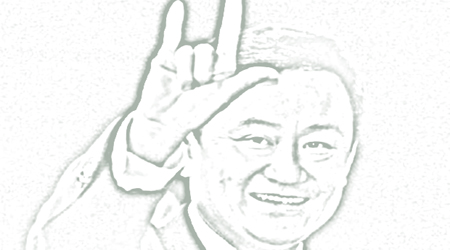Juwae say Thaksin was instrumental in bringing separatists to peace process
Exiled former prime minister Thaksin Shinawatra was instrumental in convincing separatist groups especially the Barisan Revolusi Nasional (BRN) to join the peace talk process, according to the Juwae.

In an exclusive interview with the Isranews, the Juwae disclosed that the separatist groups had set three pre-conditions that the government had to meet if peace talks were to be held. The conditions are: the Thai state must declare clearly that peace talk process is the only means to resolve the southern conflict and that the process must be open; Malaysia must assume the role of being the mediator; and the process must involve all separatist groups.
The Juwae admitted that they were caught in surprise that the government of Prime Minister Yingluck Shinawatra accepted the conditions, noting that previous talks had always been held secretly in closed doors such as the secret talks between the government during Abhisit Vejjajiva’s premiership and Gustury Mahgota, president of the New PULO, with HDC, an international non-governmental organistion, serving as the facilitator.
The Juwae said that some separatist groups initially did not trust Thaksin but they decided to join the talks anyway for fear of "missing the last train".
Asked why Malaysia as the mediator, they explained that Malaysia, Thailand’s next neighbor, is the only country which is well aware of the southern conflict. Moreover, Malaysia has been affected by the conflict too.
However, they admitted that Malaysia has vested interests in the conflict just as the other parties. "But we will benefit the most if Malaysia is involved in the role of the mediator," they said.
The Juwae brushed aside the claim that the separatist groups were forced into signing the peace agreement with the government in Kuala Lumpur on February 28, saying that secret talks were held in 2012 with Thaksin.
They insisted all separatist groups were free from Malaysia’s control, noting that some groups did not join in the signing of the peace talks agreement although invited.
Asked about the demand for observers to witness the peace talks, the Juwae admitted that they were concerned that the government might not keep the agreement, citing previous talks when the government’s negotiators claimed they were not authorized by the government to enter into the talks.
The Juwae said that political uncertainty would pose an obstacle to the peace talks but, nevertheless, the talks must go on no matter which party will become the government.
They pointed out that the past and present Thai governments’ policy towards the southern unrest problem had always been the same – that is they focused on military strategy as the leading policy.
They suggested that the southern unrest issue be made a national agenda so that the issue would be kept alive no matter which party is in the government.
The Juwae said that they were not satisfied with the Thai media’s name-calling of the separatists as bandits. They admitted that it was possible that there were bandits among them in the past "but today many of us are well educated and are specialists in different fields." "Are they deserved to be called bandits?" they asked.
For the time being, the Juwae said that there are only three separatist groups which are still active namely the BRN, PULO and BIPP.
-------------------------------------------------------------------------------------------------------------------
Caption : Thaksin Shinawatra
